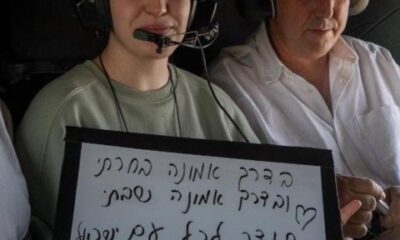
Featured Item

Propaganda-averse Israel losing psychological war
There are two types of war being fought in the Middle East – a physical and a psychological war – but only one side is fighting and winning the latter war, says international psychological warfare expert Ron Schleifer.
Schleifer said the psychological war was dominated by Hamas and Israel’s enemies, and if he was to “draw a cartoon of Hamas”, he “would draw a puppet master” because it was using media and politicians to do its bidding.
Schleifer, a senior lecturer at Ariel University in Israel, is in South Africa at the moment on a speaking tour. He told the SA Jewish Report that this type of warfare, which cleverly incorporates propaganda, is used to “persuade the enemy that he has no chance”. Psychological warfare is a major tool in the Israeli-Palestinian conflict, he said.
Schleifer said Hamas had managed to entrench an “extreme anxiety deep down in the Israeli psyche”, which had fuelled doubt and fear after the “large-scale pogrom” on 7 October. Israeli citizens, he said, now question the government, security, and democracy. He believes Hamas managed to create doubt in Israeli society and “save face” and “protect” itself in the international arena through a “long campaign of five or six decades” of sharing a certain truth with the world through propaganda techniques.
Schleifer recalls the 2006 kidnapping of soldier Gilad Shalit and the anguish it caused in Israeli society. “This showed Israel in a bad light to target audiences – the home front; the Arab world; and the neutrals, America and Europe. How come the mighty Mossad and Shin Bet, not to mention high-tech, couldn’t trace one soldier 45 minutes away from Tel Aviv?” He commented on the doubt that grew among Israeli society and the international world about the capabilities of Israel and if the allocation of funding was justifiable without deliverables. “This is the groundwork for what we see now,” he said.
“In the Arab world, it goes without saying that there is a ministry of propaganda,” Schleifer said. “In [Israel], it was only recently installed, and called the ministry of strategic affairs or diaspora relations.”
Schleifer describes Israel’s aversion to propaganda by stating, “If you ask an Israeli chief of staff what’s more important, another F35 or a proper propaganda wing at the same cost, they will always have the same answer, another F35.”
Israel is uncomfortable with the idea of propaganda, he said, and hasn’t invested effectively in the psychological war at hand. Hamas, on the other hand, is successful in its psychological warfare techniques and persuasion of the media and international world.
Psychological warfare is far more accessible today with increased technology and social media presence. “Why not use it for persuasion?” Schleifer asks. Hamas and Arab nations, he said, have a stronghold over propaganda and psychological techniques, understanding how to use the media to achieve their goals. Hamas “persuades journalists who in turn persuade readers” to support Hamas’s anti-Zionist agenda.
“Propaganda isn’t turning white into black, and vice versa. It strengthens shades which feeds your interest,” said Schleifer. To understand the exploitation of the humanitarian crisis in Gaza, he offers the explanation of the “Palestinians and Soviet puppet masters investing enormous sums of money to bribe the West into submission to the Palestinian message, basically Soviet Russia’s [anti-Western] message.
“Generally, with propaganda, you start with children. The Saudis were funding school children’s books about the Middle East, giving a specific message. The Palestine Liberation Organization [PLO] was distributing enormous amounts of books to children.” The campaign extended further to university campuses in America and Europe.
“From the 1970s, the PLO invested in penetrating student unions on European and American campuses. There was a trend in Europe of anticolonialism. What they had to do was attach their political goal to the contemporary philosophy. So, Israel, which was never a colony, became colonialist.
“It worked on students who wanted to improve the world. They approached humanities and social sciences students,” Schleifer said. He said the anti-Israel lobby went as far as taking students on field trips to visit refugee camps in Gaza.
“And nobody can support the Zionist movement after seeing open gutters flowing in Gaza,” Schleifer said. “Israel could explain 10 times over how the PLO objected to reconstructing Gaza and installing irrigation and sewage systems, and even threatened and killed those who allowed Israel to improve their conditions.
“But you have those students that climb the ladder in media and politics, and then from Israel’s point of view, it’s too late”.
He said further, Israeli shlichim go to international campuses because of the strength of their ideology rather than their linguistic capabilities, which is another shortcoming in Israeli propaganda strategy.
“Once all [Israeli] intelligence organisations admit that propaganda is the major enemy and not nuclear Iran nor the Jordanian and Egyptian chief of staff’s secret invasion plans, then [Israel] can begin copying the Palestinians copying [Israel],” Schleifer said.
Israel is an “insecure” country as the population is divided over what the future of the state should be besides the general concept of peace and security, Schleifer said. “[Israel] was founded 75 years ago. We’re a very young, powerful, but insecure country. Our enemies take advantage of this insecurity.
“Hamas has broken the sense of confidence the Jews have created for themselves after 1 900 years,” he said.
Schleifer explores the difference in Israeli and Palestinian mindsets at war. “[Palestinians] say that [Israel] loves life, and [Palestinians] love death. This is deterring [Israel] tremendously in the physical war. How can you deal with somebody who doesn’t mind being killed, not only doesn’t mind, but actively encourages it?”
He said Hamas’s and Israel’s enemies’ psychological warfare had a real impact on Israeli decision makers.
“The [Israeli] government has yielded to the pressure. Israeli society is pressuring Prime Minister Benjamin Netanyahu to prioritise the lives of Israeli hostages, through weekly demonstrations. This has an impact on Netanyahu’s response as he cannot retaliate with extreme force to eliminate Hamas because he would be held accountable for the deaths of the hostages, Schleifer said.
“It’s not a coincidence” that the hostage releases and recordings shared by Hamas of hostages “are done on a Saturday”, Schleifer said. “First, to humiliate Israel. Second, it provides material for media coverage of the Saturday night demonstrations of the hostage families.” He believes it’s time for Israel to catch up in the psychological warfare stakes.










